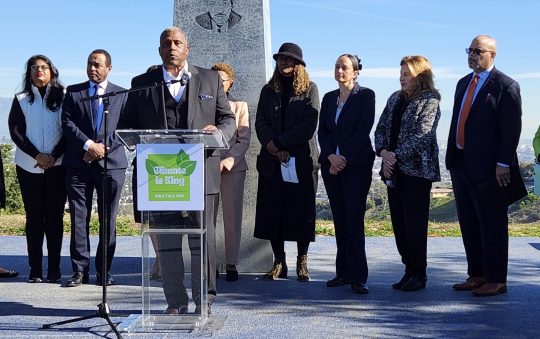The Los Angeles County Departments of Health Services, Public Health, and Mental Health are starting a new program called Whole Person Care (WPC). WPC will assist tens of thousands of Los Angeles residents. It will mainly help people with high levels of unmet physical health, mental health, and social need. Instead of focusing on just one aspect of health, under WPC eligible people will receive integrated care and services. WPC looks at a broad range of factors that affect overall health. This includes finances, neighborhood safety, and individual healthy or not so healthy behaviors.
The California Department of Health set aside funds from the Medi-Cal program. These funds will support Whole Person Care (WPC) Pilot programs in California. Each WPC Pilot program is designed around several key elements. One is identifying group of vulnerable people who have Medi-Cal insurance. Another is collaborating between different public and private sectors. Another is coordinating services across the different sectors and sharing data to meet the needs of high-risk patient. There will be 11 Whole Person Care Pilot programs in Los Angeles County. The programs will target six different high-risk groups. These include people who are: homeless; re-entering the community from the justice system; severely mentally ill; substance users; expectant mothers with conditions that affect birth outcomes; or chronically medically ill. Many of the eligible people have several of these high-risk conditions. Los Angeles County has nearly four million people who have Medi-Cal. The WPC program will serve 60,000-75,000 of the most sick Medi-Cal patients who have unmet clinical, behavioral health, and social service needs. It has been shown these problems lead to poor health outcomes such as premature death, preventable hospitalizations and emergency room visits.
One of the WPC programs is the Dr. David L Murphy Sobering Center. It opened in January 2017. The center has a partnership with LA County’s Fire Department and Emergency Medical Services. People who struggle with intoxication can be brought to the center as a safe place to become sober. People admitted to the sobering center are also provided support. The center connects them to interventions that help them break out of the cycle of addiction/intoxication. The goal is to prevent these vulnerable people from winding up on the streets, in jail, or in the hospital.
A second program funded through WPC, is One Degree. One Degree is a tool that helps individuals find, access, and rate community resources for services. These services may include affordable housing, childcare, and food. Health care providers can also refer patients for resources available on One Degree. They can then track their patients’ progress through the system. One Degree will soon be available county-wide on-line. According to Dr. Clemens Hong, the director of WPC programs at the Department of Health Services for Los Angeles, One Degree can be seen as a “Yelp for community resources.”
The community plays a pivotal role in these efforts. Dr. Hong, believes that the collaboration between community health workers, churches, or other community organizations and the Los Angeles County in WPC programs is critical. It helps provide better access to resources for different vulnerable communities. In addition, utilizing community programs and community health workers also helps create more jobs. Academic institutions in Los Angeles are also contributing to the effort. The University of California, Los Angeles (UCLA) is conducting the evaluation of the WPC programs across the state. Several UCLA and University of Southern California (USC) researchers are working with the Los Angeles public health system to help evaluate the effectiveness of these programs for each of the targeted vulnerable communities.
To receive services through WPC applicants must reside in Los Angeles County. They also must have or be eligible for Medi-Cal and meet eligibility criteria for one or more of the 11 programs. If you think you might be able to benefit from one of these programs, you can visit the website and learn more about available programs at https://dhs.lacounty.gov/wps/portal/dhs/wpc. To learn more about One Degree, go on the website www.1degree.org/la, download the app on your cell phone, or talk to your primary care provider.
If you have, any questions about the new resources offered in your community feel free to comment on this article with any questions you may have.








